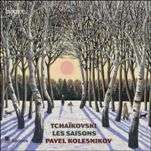|
Back
08/09/2014
Pyotr Ilyich Tchaikovsky: Les Saisons, Opus 37b – Six Morceaux, Opus 19
Pavel Kolesnikov (piano)
Recording: Concert Hall, Wyastone Estate, Monmouth, UK (August 2013) – 75’31
Hyperion CDA68028 – Notes in English, French, and German

   
Russia-born, London-based pianist Pavel Kolesnikov won top honours at the 2012 Honens International Piano Competition which launched his recording career with a two-CD set (on the Honens label) of the performances that gained him his prize. His follow-up CD has been issued by the UK’s Hyperion label. It is a charmer.
Tchaikovsky’s The Seasons (originally titled Les Saisons)could well be titled The Months, as the work consists of 12 pieces each representing a month. They were originally published month-by-month in a Saint Petersburg newspaper in 1876. The 12 pieces total almost 45 minutes in length, but were not designed to be played as a suite like, for example, Robert Schumann’s Kinderszenen. Each one is a miniature evocation of something associated with its month, for example January is “By the Fireside”, February is “Carnaval”. Furthermore, there are evocations of bigger works Tchaikovsky later composed. The January piece, with its tentative, even shy, atmosphere, suggests Tatiana’s “Letter Scene” in Eugene Onegin, a work he began just two year after these were completed.
The companion to The Seasons is Six Morceaux, Op. 19, (Tchaikovsky composed another group with same overall title, his opus 21). These are, on the whole somewhat bolder than The Seasons, and often reveal the influence of Schumann. Supporters of Russian Nationalism in music looked askance at Tchaikovsky because of his affinity for foreign (mostly German) exemplars. These pieces work better than The Seasons as a through-played suite, although the pieces can stand on their own, especially the 6th, “Theme and variations” in which Kolesnikov gives each of the 12 variations its full degree of individuality - as he does with all the pieces on the CD.
In his own note, Pavel Kolesnikov states that the pieces are “too subtle and fragile for large halls.” This probably accounts for the fact that there are not an overwhelmingly large number of recordings of the works (although masters such as Emil Gilels and Sviatoslav Richter have recorded them). It is to the credit of both pianist and label that they have chosen such a relatively subtle program as what we hope becomes the initial offering of a successful artistic partnership.
Michael Johnson
|